Resources (827 found)
Developing Disparity: Regional Investment in Burma’s Borderlands
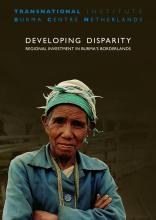 Unless foreign direct investment in Burma’s war-torn borderlands is refocused towards people-centered development, it is likely to deepen disparity between the region’s most neglected peoples and Burma’s new military, business and political elite and exacerbate a decades-long civil war.
Unless foreign direct investment in Burma’s war-torn borderlands is refocused towards people-centered development, it is likely to deepen disparity between the region’s most neglected peoples and Burma’s new military, business and political elite and exacerbate a decades-long civil war.
Burma has entered a pivotal stage in its political and economic development. The advent of a new quasi-civilian government has raised the prospect of fundamental reforms […]
Report of Evidence Regarding Controversies at Letpadaung Hill Copper Mine Project
Executive Summary This report was prepared by Lawyers Network, an independent association of leading lawyers throughout Myanmar, and Justice Trust, an international group that supports national efforts to advance rule of law and human rights. It concerns recent controversies at a Letpadaung copper mine, a joint venture between Wanbao Mining, a subsidiary of North China […]
• • •World Report 2013: Burma
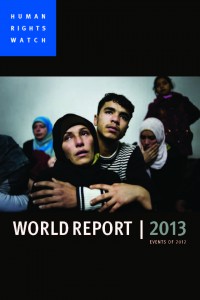 Burma’s human rights situation remained poor in 2012 despite noteworthy actions by the government toward political reform. In April, opposition leader Aung San Suu Kyi and her National League for Democracy party won 43 of 44 seats it contested in a parliamentary by-election; the parliament consists of 224 seats in the upper house and 440 in the lower house, the majority of which remain under the control of military representatives or former military officers
Burma’s human rights situation remained poor in 2012 despite noteworthy actions by the government toward political reform. In April, opposition leader Aung San Suu Kyi and her National League for Democracy party won 43 of 44 seats it contested in a parliamentary by-election; the parliament consists of 224 seats in the upper house and 440 in the lower house, the majority of which remain under the control of military representatives or former military officers
President Thein Sein welcomed back exiles during the year, and released nearly 400 political prisoners in five general prisoner amnesties, although several hundred are believed to remain in prison. Freed political prisoners face persecution, including restrictions on travel and education, and lack adequate psychosocial support. Activists who peacefully demonstrated in Rangoon in September have been charged […]
Deciphering Myanmar’s Peace Process: A Reference Guide
The new nominally civilian government is making serious efforts to achieve peace in Myanmar after more than 60 years of civil war. Peace is critical for ending human suffering and achieving stability; a precondition for overcoming poverty, ensuring long term development and protecting
• • •Chance for Change: Ending the Recruitment and Use of Child Soldiers in Myanmar
This report shows that despite nearly a decade of international engagement and the June 2012 signing of a Joint Action Plan to end the recruitment and use of children between the Myanmar government and the UN, children continue to be recruited and used as soldiers by the Tatmadaw Kyi […]
• • •Nay Pyi Taw Accord for Effective Development Cooperation
The Nay Pyi Taw Accord for Effective Development Cooperation was presented to development partners by the Minister of National Planning and Economic Development and approved by acclamation at the First Myanmar Development Cooperation Forum, Nay Pyi Taw, 20th of January 2013. Read the full text of the accord here.
• • •Burmese Media Spring
This report examines the state of the changes carried out by the government and offers detailed recommendations designed to improve respect for freedom of information in Burma and ensure that the improvements are lasting […]
• • •Cyclone Giri: Two Years On
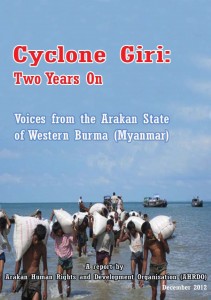 This report, published on the second anniversary of the cyclone, documents and highlights the situation in Arakan State before, during and after Cyclone Giri […]
This report, published on the second anniversary of the cyclone, documents and highlights the situation in Arakan State before, during and after Cyclone Giri […]
The Rule of Law in Myanmar: Challenges and Prospects
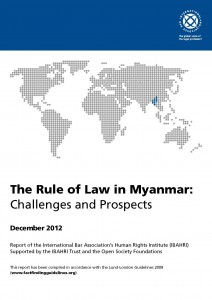 Myanmar is on the cusp of major reforms, but it needs to confront and overcome the legacy of its recent past if those reforms are to make progress. In order to understand Myanmar’s prospects and needs at this important juncture and, more specifically, to find out how far it has begun to adhere to globally prevalent understandings of the rule of law, the International Bar Association’s Human Rights Institute (IBAHRI) sent a delegation to the country’s major cities on a fact-finding mission between 11 and 18 August 2012. Its assessment and conclusions are laid out in this report […]
Myanmar is on the cusp of major reforms, but it needs to confront and overcome the legacy of its recent past if those reforms are to make progress. In order to understand Myanmar’s prospects and needs at this important juncture and, more specifically, to find out how far it has begun to adhere to globally prevalent understandings of the rule of law, the International Bar Association’s Human Rights Institute (IBAHRI) sent a delegation to the country’s major cities on a fact-finding mission between 11 and 18 August 2012. Its assessment and conclusions are laid out in this report […]
Danger Zone: Giant Chinese Industrial Zone Threatens Burma’s Arakan Coast
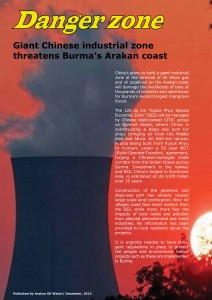 China’s plans to build a giant industrial zone at the terminal of its Shwe gas and oil pipelines on the Arakan coast will damage the livelihoods of tens of thousands of islanders and spell doom for Burma’s second largest mangrove forest. The 120 sq km “Kyauk Phyu Special Economic Zone” (SEZ) will be managed by Chinese state-owned CITIC group on Ramree island, where China is constructing a deep sea port for ships bringing oil from the Middle East and Africa […]
China’s plans to build a giant industrial zone at the terminal of its Shwe gas and oil pipelines on the Arakan coast will damage the livelihoods of tens of thousands of islanders and spell doom for Burma’s second largest mangrove forest. The 120 sq km “Kyauk Phyu Special Economic Zone” (SEZ) will be managed by Chinese state-owned CITIC group on Ramree island, where China is constructing a deep sea port for ships bringing oil from the Middle East and Africa […]









 All posts
All posts